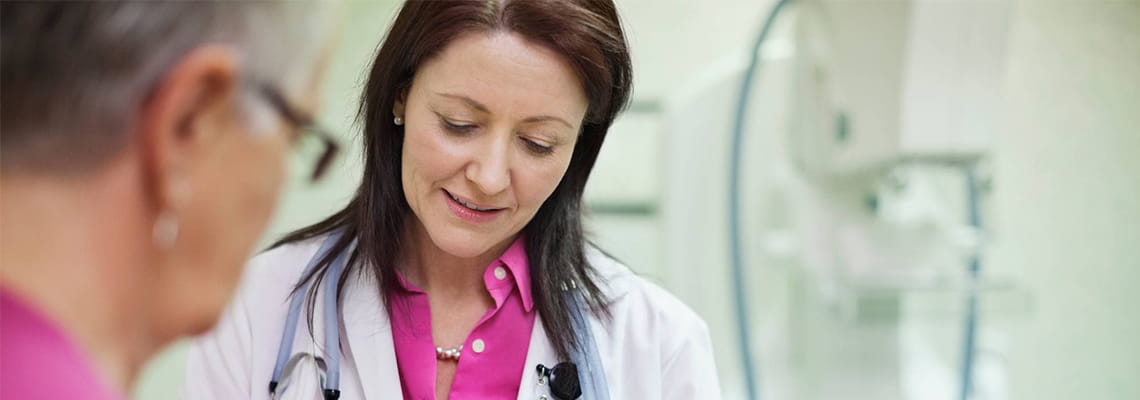COVID-19 Vaccines & Mammogram Anxiety

Perhaps you know someone who got a false positive on a mammogram after receiving the COVID-19 vaccine. Or you heard or read an expert recommend delaying screening because of such confusion.
Don't let it change your plan, says Dr. Luz Venta, medical director of Houston Methodist Breast Care Centers.
"We're getting a lot of patients asking when they should get their mammogram if they just got the vaccine," says Dr. Venta. "The answer, if you're scheduled for one, is now. Get it when you're due, irrespective of whether you had the vaccine last week or two days ago, or are scheduled to get it next week."
"It's a no-brainer," says Dr. Venta. "You definitely don't want to delay a possible diagnosis of cancer."
If the mammogram does detect swollen lymph nodes, Dr. Venta says Houston Methodist will schedule a follow-up appointment during which a team member will perform an ultrasound to determine whether the swollen lymph nodes indicate breast cancer or a recently administered COVID-19 vaccine.
Here's what we know about the vaccine and mammograms:
Enlarged lymph nodes caused by the COVID-19 vaccine are real, but relatively rare
The Moderna and Pfizer COVID-19 vaccines are making some mammogram results harder to evaluate because of enlarged lymph nodes, a possible indicator of breast cancer but also a side effect of the shots. As a result, physicians around the country are reporting an uptick in false positives.
Concern about the phenomenon has caused some institutions and professional societies to suggest postponing screening. Even the Society of Breast Imaging recently advised that "when it does not unduly delay care," patients and providers might consider scheduling screening exams four to six weeks following the second dose of COVID-19 vaccination if the first one has already been given.
But Dr. Venta downplays the concern, noting that the vast majority of women won't experience lymph node enlargement. In the Moderna trial, for instance, 11.6% of women getting the first shot of the vaccine had swelling, compared to 5% who got a placebo. Sixteen percent had swelling after the second shot, compared to 4.3% who got a placebo.
"The bottom line is that nearly 90% of women see no difference in their lymph nodes after getting the vaccine," says Dr. Venta. "Delaying mammograms, given such statistics, is very illogical."
Dr. Venta notes that doctors are still playing catch-up because of COVID-19. Houston Methodist Breast Care Centers were closed for nearly two months last spring, and even after they reopened some women were for a time too scared to return.
Bottom line: Post-vaccination lymph node swelling is common and harmless
Dr. Venta notes the swelling that occurs after vaccination means the immune system is doing its job, defending the body when a foreign substance becomes present. In the presence of invaders, white blood cells in the lymph nodes increase to mount an attack, causing swelling.
The bean-shaped lymph nodes can be found throughout the body but cluster in certain areas, including the armpit. Swelling there, which can be mistaken for cancer, is a normal response to vaccination. It is most likely to have been caused by the vaccination if the shot was given in the same arm.
Such swelling itself is benign and will resolve on its own over a short period of time.
If the swelling doesn't resolve, it may indicate breast cancer, a development best diagnosed as soon as possible — which is why it is so important not to delay a scheduled mammogram.
Dr. Venta emphasizes that the vaccine can't cause breast cancer. In cases where cancer is diagnosed, "the patient had it first," she says, "then she got the vaccine."
She says she understands the anxiety a woman may feel during a month wait for a follow-up ultrasound appointment, but says the risk of delaying a possible diagnosis of breast cancer is worse.
"That's a little like saying, you shouldn't get a mammogram at all because the time you wait causes anxiety," says Dr. Venta. "If I had lymph node swelling after vaccination, I think I'd want the assurance of having a mammogram and evaluation and being told there's nothing there, and that the swelling is probably the result of the vaccine and we'll see you in four weeks."
"The dangerous thing is having breast cancer that's causing lymph node enlargement and you blow it off because you figure it's because you had the vaccine."
